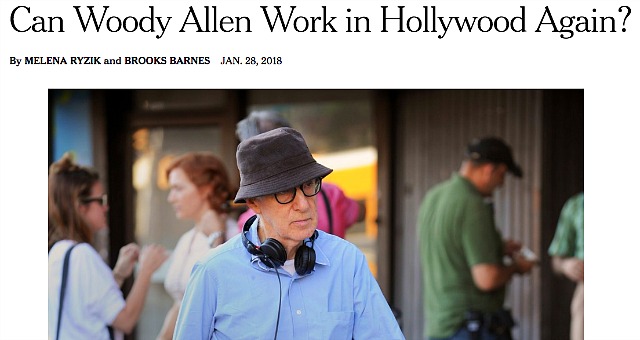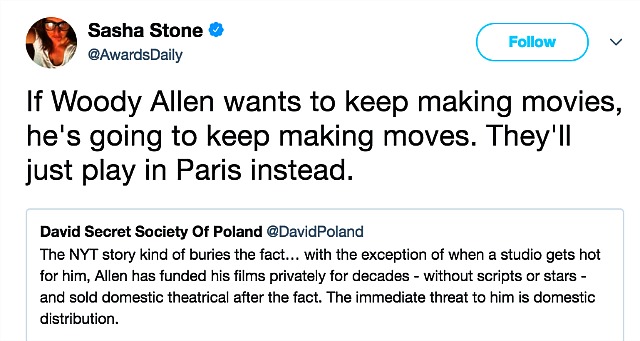A 1.28 N.Y. Times story by Brooks Barnes and Melana Ryzik examines Woody Allen‘s precarious financial situation as far as future films are concerned, and particularly in the wake of several #MeToo statements of support and allegiance for Dylan Farrow, who has continued to accuse Allen of having molested her in 1992, when she was seven.
The article all but sidesteps the substance and veracity of Farrow’s accusation. It merely reports that several actresses and actors have publicly said they believe Farrow, and that (many?) other actors in the film industry would probably be reluctant to work with Allen henceforth.


The piece reports that U.S. distribution of Allen’s A Rainy Day in New York, which was financed by and is due to be distributed by Amazon, is in doubt.
“The company has not made any decisions about the film’s future,” Barnes and Ryzik report, “but Amazon is having serious conversations about ending its relationship with Mr. Allen, which could leave the movie without distribution, according to two people briefed on the matter who spoke on the condition of anonymity to discuss internal deliberations.”
They also report that Amazon currently “has contractual obligations to Mr. Allen and the film,” according to an Amazon-related source.
Allen’s “artistic vision may be out of step with the times,” the article states. “His last four films have flopped at the North American box office, taking in a cumulative $26.9 million — roughly half of which goes to theater owners — while carrying a collective $85 million in estimated production costs, not including marketing.”
Allen’s producer Letty Aronson is “defiantly confident” that Allen can make any movie he wants, the article says. “Financing is already in place for the script he’s working on now, she said, outside the Amazon deal. As for casting, actors are a renewable resource. ‘I have no doubt, Aronson said, ‘that he’ll be able to find new talent.'”
If the N.Y. Times had published a piece about the fortunes of John Proctor in the late 1690s, it would avoid examinations or conclusions about his alleged ties with witchcraft and the workings of Satan, and confine its focus to whether or not the Salem community regards Proctor as guilty or innocent, and whether or not Proctor would be facing execution if public opinion is against him.

